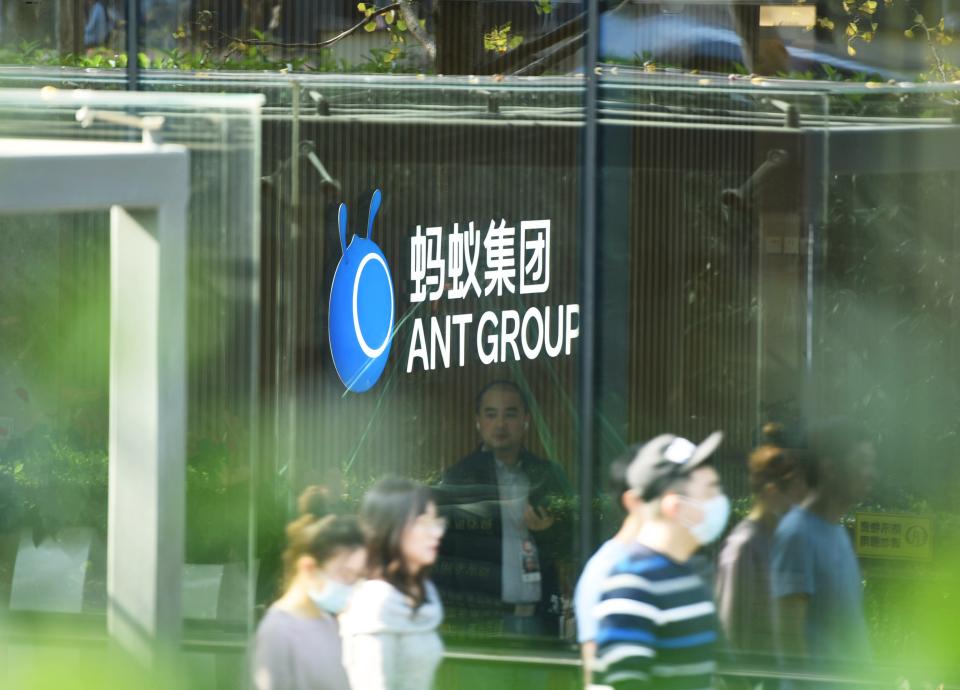Ant Group's identity crisis after suspended IPO: Is it a bank or a tech company?
You’d be excused for having missed major Chinese tech news that broke last week on U.S. Election Day: Ant Group, two days before what would have been the biggest IPO in history, had its Shanghai listing suspended by Chinese regulators. Ant in response also suspended the Hong Kong half of its dual listing.
This wasn’t how it was supposed to go for Ant, which raised $34.5 billion (more than Saudi Aramco’s record $29.4 billion) and had more than $3 trillion in bids from individual investors in Hong Kong and China, money that now must be refunded. (In Hong Kong, retail investors pay in full when they bid for shares of an IPO.)
Chinese regulators approved of the listing on Oct. 19. On Nov. 3, they were sounding a very different tune.
What happened?
According to Ant Group’s own summation after the Shanghai IPO suspension, the reasons Chinese regulators gave were that the listing “may not meet listing qualifications or disclosure requirements due to material matters relating to the regulatory interview of our ultimate controller, our executive chairman and our chief executive officer by the relevant regulators and the recent changes in the fintech regulatory environment.”
The meeting referred to in that statement happened on Nov. 2, when four top Chinese financial regulators met in person with Ant founder and biggest stakeholder Jack Ma, Ant executive chairman Eric Jing, and Ant CEO Simon Hu. Ant’s Nov. 2 statement after that meeting was vague: “Views regarding the health and stability of the financial sector were exchanged. Ant Group is committed to implementing the meeting opinions in depth and continuing our course based on the principles of: stable innovation; embrace of regulation; service to the real economy; and win-win cooperation.”
Clearly, the meeting went poorly. The next day, Ant’s listing on Shanghai’s STAR market was suspended.

It certainly didn’t help Ant’s cause when Jack Ma, in a speech at the Shanghai Bund Summit on Oct. 24 attended by Chinese finance officials, railed against the Chinese banking system. Ma said that state-run banks have a “pawnshop mentality” because they aren’t willing to take on risk, and aren’t ready for the future financial world.
This was no new concept. Chinese officials have been in a push-and-pull with Chinese fintech companies for years. But Ma said the quiet part out loud. “Ma was flaunting it, and has been doing it for years, appearing in public as a rock star,” says Gordon Chang, author of the book “The Coming Collapse of China.”
Ma’s “pawnshop” comment, specifically, was about Chinese state-run banks requiring collateral and guarantees for credit lending. Meanwhile, small businesses in China, rejected by state-run banks, are desperate to get access to loans. Ant and rival Tencent (through its own lending business, WeBank) help small businesses get those loans.
Ant Financial was established in 2014 to house Alipay, the biggest mobile payments app in China, which was spun out of Alibaba in 2011. But the growth engine of Ant is its credit division, which offers a credit card as well as micro-loans (without collateral) through Alipay. That division has grown rapidly over the last year, and now makes up 40% of Ant Group’s revenue, it disclosed in its IPO documents. The attractiveness of the IPO was Ant’s lending business, not its payments app.
That is the crux of Ant’s problem. The Chinese government sees it as functioning like a bank, and wants to regulate it like a bank.
Ant knew this problem was coming. In June, leading up to the IPO, it dropped the word “financial” from its name in an obvious attempt to rebrand as a tech company and ward off financial regulators.
It didn’t work.

“Everybody who was paying attention had to know there’d be an attack on Ant,” says Chang. “But I didn’t think they would cancel the IPO. And pulling the plug within 36 hours of the start of trading was unprecedented. It shows that the Communist Party government has become erratic and unpredictable. I think it’s a warning to Chinese fintech and to all Chinese private businesspeople: the Communist Party can reach out and make your life quite miserable. And they’re willing to prevent the change that needs to occur if China is going to have a modern economy. Ant was changing the way people borrow money.”
This is much bigger than Ant—the Ant IPO suspension was also a warning shot at Tencent (whose WeChat Pay competes with Alipay) and other Chinese tech firms. (Tencent has been here before; it was hit hard in 2018 by government restrictions on video game approvals.)
China’s government-backed digital currency, which it began testing in October, is also a warning shot at Ant and Tencent because it could undermine use of Alipay and WeChat Pay.
And all of this is happening amidst a much broader and intensifying anti-monopoly crackdown by the Chinese government on large Chinese tech companies.
The question for Ant now is whether and when its IPO can still happen. Experts have predicted it could take a year or longer to make whatever changes Chinese regulators demand to approve of the IPO.
Ant, in a statement, sounds determined to make it work: “We will keep in close communications with the Shanghai Stock Exchange and relevant regulators, and wait for their further notice with respect to further developments of our offering and listing process and disclose in a timely manner.”
For now, Ant must return funds to investors and watch its valuation fall dramatically. Shares of Alibaba, which has a 33% stake in Ant, are down 11% since the IPO suspension.
And behind closed doors, Jack Ma must better navigate the system.
—
Daniel Roberts is an editor-at-large at Yahoo Finance and closely covers fintech. Follow him on Twitter at @readDanwrite.
Read more:
For Trump administration, Ant Group is not the same as TikTok
What you need to know about Ant Financial, potentially the largest IPO in history
Ant Financial’s core product Alipay hits the 1 billion users mark
TikTok deal doesn’t make much sense for Oracle beyond politics, analysts say
Amazon tells employees to delete Tik Tok, then says email was ‘sent in error’
Square is positioned to be a winner by helping small businesses digitize post-pandemic: Oppenheimer
Airbnb's cash burn underscores the urgency of its upcoming IPO
Uber Eats is bigger business than Uber rides right now, but far from profitable
